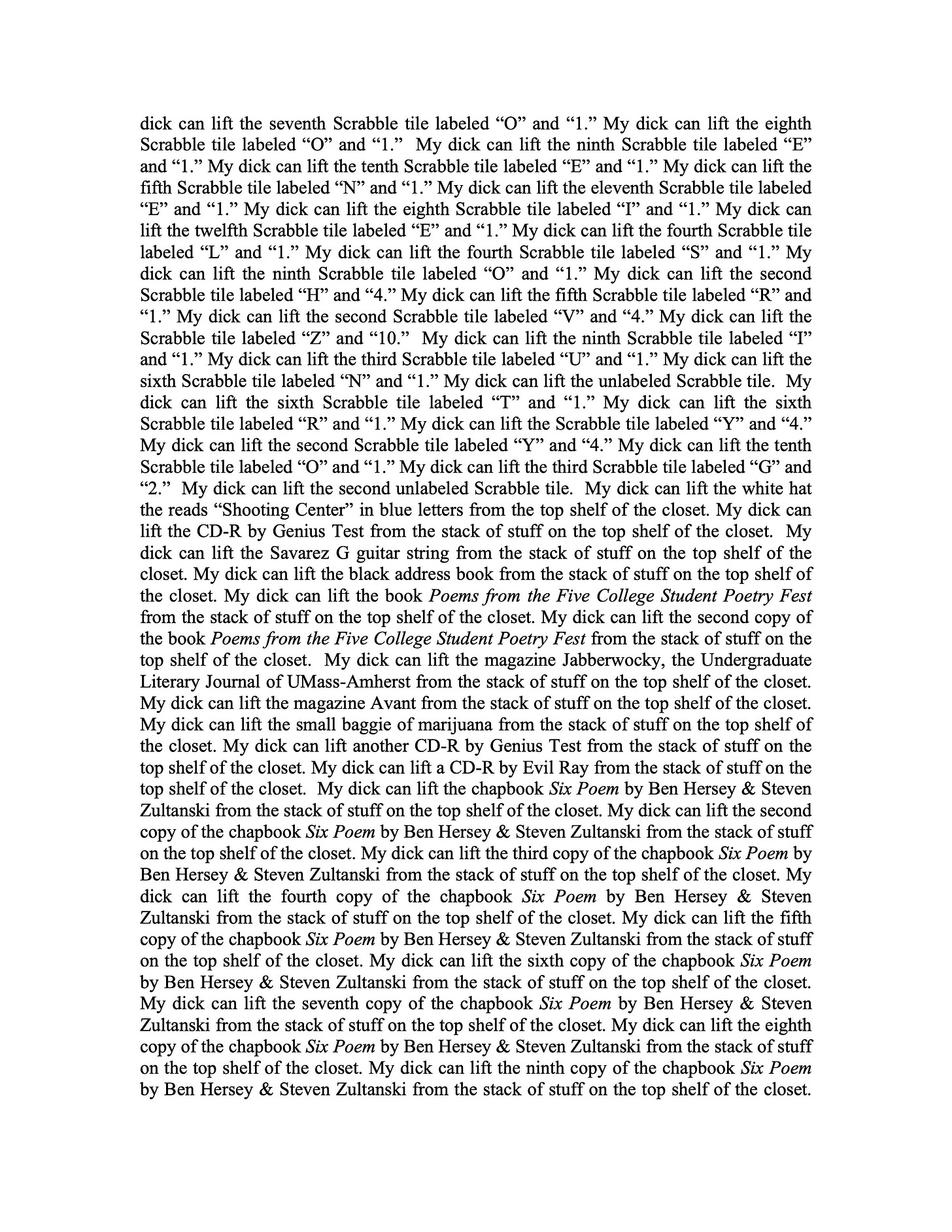The Scan Artist
What it means to copy the world
Every time I search my email inbox, I’m presented with the dick pdf. It doesn’t seem to matter what I’m searching for: a letter I wrote to a friend, a song that was sent to me in college, a meeting invite from my boss. The dick pdf will always find me.
The pdf begins:
My dick cannot lift the door. My dick can lift the white plastic end-table. My dick can lift the white plastic end-table stacked on the other white plastic end-table. My dick cannot lift the stacked white plastic end-tables together. My dick can lift the empty hsn.com cardboard box stacked on top of the stacked white plastic end-tables. My dick can lift the empty Dutch East India Trading Company box stacked in the hsn.com box.
You get the idea. The pdf is a giant wall of text: 113 pages long, no line breaks. Every single object in the poet Steven Zultanski’s home, and whether his dick can lift it.
Zultanski’s poem was sent to me (along with the rest of our class) over a decade ago by a college professor, Kenneth Goldsmith. Kenny is a self-proclaimed “uncreative” writer, most popularly known for being the first poet laureate of the MoMA, for reading transcriptions of New York City traffic reports to the Obama White House, for printing out the internet, for being Shia Labouf’s plagiarism scandal excuse, and most controversially, for reciting the autopsy report of Michael Brown as a piece of poetry.
He considers himself something of a provocateur both inside and outside of the classroom. On one memorable occasion our homework assignment was to “liberate documents that aren't meant to be liberated.” I attempted to hack into Kenny’s emails. He didn’t fall for my phishing scam (I suspect only because he was often unresponsive to emails in general), but I think he would have enjoyed it if he had.
Pad is not a poem that I particularly like, but because of an accidental alignment of its exhaustiveness with keyboard bloat, the poem is one that I am confronted with more than any other, and as such it is the first thing that I thought of when I encountered everything.can.be.scanned.
Everything.can.be.scanned is an Instagram account that does exactly what it says on the box, which is to say that it posts reproductions of toys, food packaging, tools, clothing, currency, electronics, government documents—anything, presumably, that can fit in the bed of a scanner.
Everything.can.be.scanned is part of a long lineage of what I would call “stunts of tedious comprehensiveness:” John F. Simon, Jr.’s 1997 Every Icon, Huang Qingjun’s series, beginning in 2003, photographing Chinese families with all of their belongings, Blendtec’s contemporaneous viral Will it Blend? marketing campaign, the litany of everyword bots on Twitter starting around 2007, and Sophie Calle calling every person in a random address book she found on the street in Paris, published in 2012.
Kenny’s work—especially at the time that we crossed paths—was also part of this cultural landscape. His schtick was retyping or recontextualizing an existing thing and calling the copy a poem. The result was not meant to be read but discussed, and when it was discussed, the emphasis was always on the every: every word of an issue of the New York Times, every movement his body made in a day, every word he spoke for a week, every radio weather forecast for a year, every page of the internet.
When his work was interesting, I would argue that it was not for its tediousness but for its attentiveness. When it wasn’t, it was because there wasn’t enough attention being paid, or because the attention was being directed towards the wrong thing.
At time of writing, everything.can.be.scanned has more posts (1,054) than it has followers (950), which is to say if it is trying to gain attention for itself, it isn’t doing a great job. Instead, it directs its attention towards the visual culture of the mundane. “Every single object,” its Russian creator writes, “is a result of one’s work, and it is essential for me to track the result, consider, and experience and enjoy it.” I recommend scrolling through the profile page, rather than simply clicking “follow” and waiting for it to be randomly injected into your feed. The effect is one of quiet awe: awe at the sheer magnitude of ephemera in existence, awe at the impossibility of scanning the whole world, and most of all, awe at the slow attention of the one who dared to try.
🪴 Screenshot garden
Internet diving hauls presented without context
📄 Plaintext
Word associations
A brief excerpt from the project I mention above, in which Sophie Calle attempts to interview every person in a stranger’s address book:
We meet in a bar in Montparnasse. I tell him that the name of the owner of the address book is Pierre D. Yes, they have known each other for a long time… through the film world.
He says, “He's an intelligent fellow; he is touching because he is lonely. No duplicity in his personal relationships. Deeply loyal to his friends. Unselfish…”
- Has he always lived alone? “I think so, I'm not sure.”
His tastes? “He loves minor literature, B movies, serialized 19th century novels…and also opera…”
Can he describe Pierre for me? “He's not very tall. He shows some signs of premature aging, like grey hair. He dresses negligently. One senses that he's really a caring person.”
It seems that two years ago Pierre may have confided in him about an unhappy love affair. Pascal does not have anything more to say. He really does not remember. Two days ago he had dinner at Pierre's. Beef and pasta.









